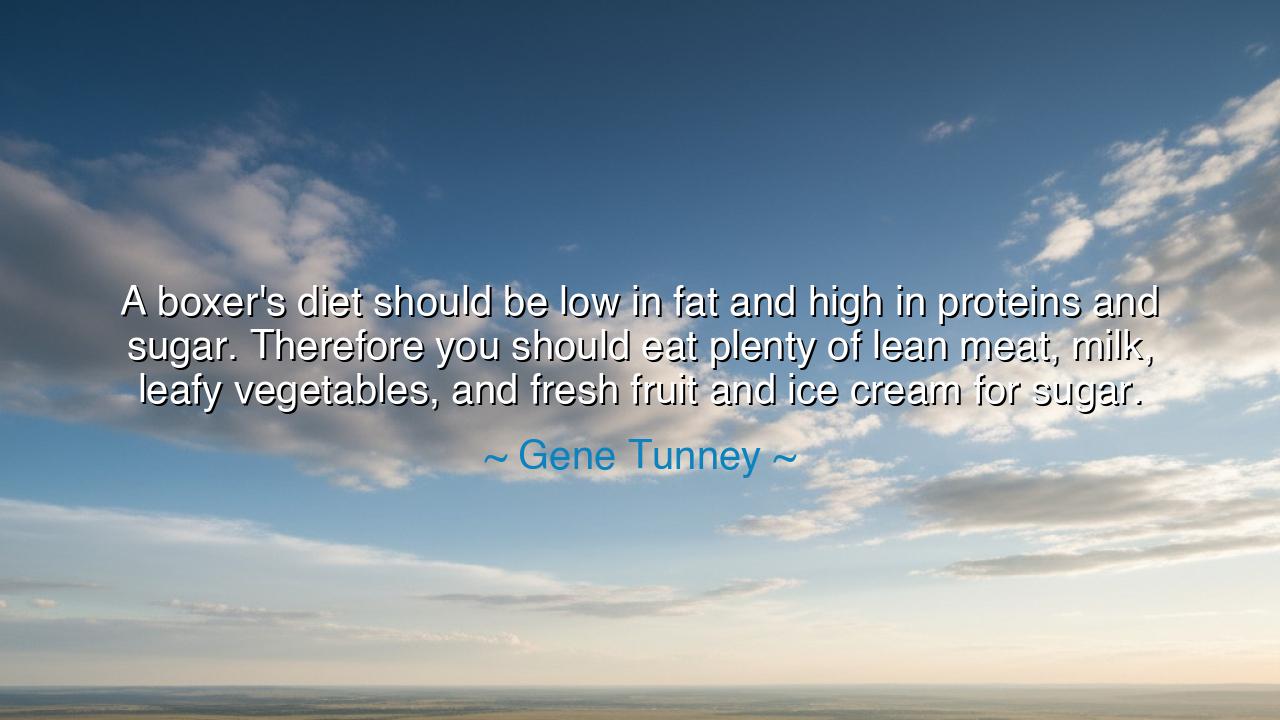
A boxer's diet should be low in fat and high in proteins and
A boxer's diet should be low in fat and high in proteins and sugar. Therefore you should eat plenty of lean meat, milk, leafy vegetables, and fresh fruit and ice cream for sugar.






“A boxer’s diet should be low in fat and high in proteins and sugar. Therefore you should eat plenty of lean meat, milk, leafy vegetables, and fresh fruit and ice cream for sugar.”
Thus spoke Gene Tunney, the champion of champions — a man whose fists once thundered in the ring, but whose wisdom carried far beyond it. In this simple counsel, Tunney revealed not only the science of strength, but the philosophy of balance, the art of sustaining both the body and the spirit. His words are not merely about food, but about the discipline of nourishment, the sacred duty of tending to one’s vessel, that it may serve the will of purpose and the fire of ambition.
Tunney was no brute of brawn alone; he was a thinker, a philosopher-warrior, a student of both Plato and combat. In his creed, the boxer’s diet became a metaphor for all who strive toward mastery. To live “low in fat and high in proteins and sugar” was not only to feed the flesh, but to feed the balance between strength and vitality — between restraint and reward. The lean meat represents endurance, the milk purity, the leafy vegetables renewal, and the ice cream, a humble symbol of joy — a reminder that even the disciplined must taste sweetness, lest life become a burden too bitter to bear.
In the time of the ancient Greeks, athletes who sought the glory of Olympia were guided by similar principles. The great Milo of Croton, who trained by lifting a calf until it became a bull, was known to eat massive quantities of meat and bread to sustain his growing might. Yet even Milo, in all his strength, was taught moderation — for excess dulls the edge, and neglect weakens it. Tunney, like those ancients, understood that true power is harmony — that the body must be neither starved by pride nor drowned in indulgence. The discipline of diet is therefore the discipline of life itself.
Yet there is another wisdom hidden in Tunney’s mention of sugar — that spark of energy, that quick flame of joy. In his words, the sweetness of ice cream is not mere indulgence, but a recognition of the human need for delight. For what warrior, what artist, what dreamer can endure long without moments of light? The ancient samurai, too, allowed themselves sips of sake after battle — not to forget their trials, but to honor their perseverance. So too does Tunney’s “ice cream” stand as a symbol: the reminder that discipline without joy becomes slavery, and that life, even at its most rigorous, must leave space for celebration.
The boxer, more than most, lives on the edge between creation and destruction. Each punch he throws is a test of endurance; each step, a measure of control. His body must be both fortress and weapon, his heart both calm and burning. Thus, his diet — his chosen fuel — becomes sacred. What he consumes becomes what he is. Tunney knew that the body is the servant of the mind, but the mind must honor the body in return. To eat well is not vanity — it is a covenant between flesh and will. And through that covenant, one learns the deeper rhythm of mastery: strength through care, power through humility, endurance through balance.
This wisdom extends far beyond the ring. For all who seek greatness — in study, in art, in daily toil — must learn to nourish themselves with purpose. The world teaches indulgence or denial; both are poisons. The wise man, the true fighter, walks the middle path: feeding the body that he may feed the dream. For when the body falters, the vision dims; and when the spirit weakens, the body follows. Tunney’s words, therefore, are a call to harmony — to live in such a way that one’s habits become the silent allies of one’s destiny.
Take then, O listener, these lessons into your own life:
-
Feed your strength, not your impulses — eat what sustains, not what distracts.
-
Honor your body, for it is the chariot of your purpose.
-
Allow joy, for even the strictest discipline must bow to the soul’s need for light.
-
Seek balance, the eternal law of nature and the secret of longevity.
So spoke Gene Tunney, the philosopher in gloves, whose victories were not only won in the ring but in the quiet mastery of self. His wisdom reminds us that every act of nourishment, every bite taken with awareness, is an offering to the future we are building. Eat, then, not as the world teaches — in haste or excess — but as the ancients lived: with gratitude, with balance, and with reverence. For the body well cared for becomes the temple of will, and through it, the soul learns to strike not in anger, but in strength, and not for glory, but for grace.






AAdministratorAdministrator
Welcome, honored guests. Please leave a comment, we will respond soon